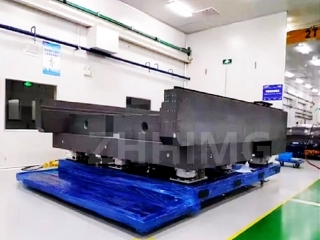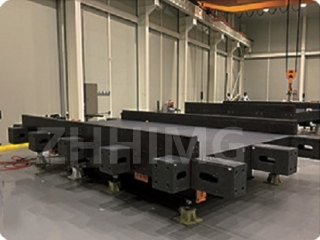In the field of flexible printed circuit board (FPC) manufacturing, laser cutting equipment is a key device for achieving fine processing, and the granite platform, as its base, is playing an irreplaceable role.
Outstanding thermal stability
During the FPC laser cutting process, the laser generator generates a large amount of heat, and at the same time, the long-term operation of the equipment will also cause the temperature to rise. Granite has an extremely low coefficient of thermal expansion, usually only (4-8) ×10⁻⁶/℃. This means that even in a working environment with large temperature fluctuations, the dimensional changes of the granite platform are extremely tiny. Compared with other materials, for instance, metals experience significant dimensional fluctuations when the temperature changes, which can affect the relative position accuracy between the cutting head and the FPC sheet. The granite platform can always maintain a stable size, providing a precise positioning reference for the cutting head, ensuring that the cutting accuracy remains at a high level all the time, avoiding cutting deviations caused by thermal deformation, and guaranteeing the dimensional accuracy and line integrity of FPC products.

Strong anti-vibration performance
During laser cutting, the high-speed movement of the cutting head and the effect of laser pulses can both generate vibrations. In addition, the operation of other equipment in the factory workshop can also cause environmental vibration interference. The internal structure of granite is dense, and the crystal particles are closely combined. It has excellent damping characteristics and can effectively absorb and buffer vibrations. Studies show that granite platforms can reduce the vibration amplitude by more than 90% in a short period of time. This excellent anti-vibration performance can prevent vibration from being transmitted to the cutting head, avoiding problems such as uneven lines and burrs at the edges caused by vibration during the cutting process, ensuring the smoothness and fineness of the cutting lines, and improving the quality of FPC products.
High rigidity and wear resistance
During the long-term operation of FPC laser cutting equipment, the cutting head moves frequently, which places extremely high demands on the load-bearing capacity and wear resistance of the base. Granite has a high hardness, with a Mohs hardness of 6 to 7, and it possesses strong compressive resistance and wear resistance. Its high-rigidity structure can stably support various components of the cutting equipment. Even under high-frequency cutting operations, it is not prone to deformation or wear. Compared with some base materials that are prone to wear, granite platforms significantly reduce the problem of precision decline caused by wear, extend the overall service life of the equipment, and lower the maintenance and replacement costs of the equipment.
Good chemical stability
There may be some chemical substances in the FPC production environment, such as cleaners and fluxes. Granite is mainly composed of minerals such as quartz and feldspar. It has stable chemical properties and excellent corrosion resistance, and is highly resistant to chemical substances like acids and alkalis. This ensures that the granite platform will not be damaged by chemical erosion in complex production environments, guaranteeing the long-term stability and reliability of the base and providing a guarantee for the continuous and stable operation of FPC laser cutting equipment.
The FPC laser cutting equipment selects a granite platform as the base because of its outstanding performance in multiple aspects such as thermal stability, vibration resistance, rigidity and wear resistance, as well as chemical stability. These features work together to enhance cutting accuracy and product quality, extend the service life of equipment, reduce overall costs, and effectively promote the high-quality development of the FPC manufacturing industry.
Post time: May-21-2025

